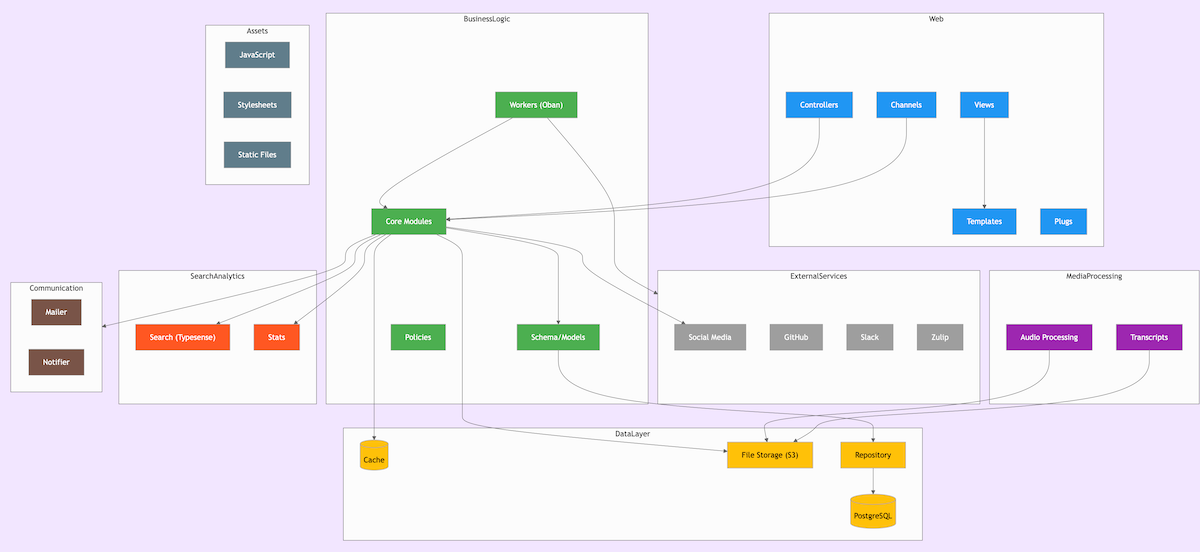Changelog News
Developer news worth your attention
Jerod here! 👋
One way folks pinch pennies these days is by downgrading their streaming subscriptions to the ad-supported plan. But just how many ads might you have to endure from any given streamer?
According to some Sherwood News research, Disney+ will likely subject you to more ads than anyone else, eating up ~13-16% of your watch time. Netflix, on the other hand, shows you ads ~3-4% of your time. These numbers are different depending on what you’re watching, and they may change at any moment, but I found them interesting, nonetheless.
Ok, let’s get into this week’s news.
🎧 It’s a peccadillo circus
Mat Ryer is back! He plays the piano, we tell each other truths/lies, we pay homage to the 8” floppy disk, Mat accepts an open source medal, and so much more. It’s a real circus. MatGPT!
🏃 The new $30,000 side hustle
Bloomberg reports (but I link to Megan McDonough’s commentary on LinkedIn because paywall) that employee referrals have become a lucrative side hustle for tech workers.
Platforms like Blind and Refermarket are connecting job seekers with company insiders willing to offer referrals— for a fee.
I’m not surprised that this is a thing, but I’m certainly disappointed. How can you feel good about making money by referring a complete stranger for a position!? I guess you get over it because it’s an easy $30k? Crazy times…
While this phenomena is likely rare, it is indicative of a job market that is way out of wack. The $30k income referenced in the headline is one individual who produced “more than a half a dozen successful hires for the company” after referring more than one thousand job candidates to his employer.
🤕 Mistakes we make in large codebases
Sean Goedecke has spent a decade working on large established codebases, which he defines as having:
- Single-digit million lines of code (~5M, let’s say)
- Somewhere between 100 and 1000 engineers working on the same codebase
- The first working version of the codebase is at least ten years old
I can’t say I’ve ever worked on a codebase in this category, so I’ll have to take Sean’s word for it. That word is…
There’s one mistake I see more often than anything else, and it’s absolutely deadly: ignoring the rest of the codebase and just implementing your feature in the most sensible way. In other words, limiting your touch points with the existing codebase in order to keep your nice clean code uncontaminated by legacy junk. For engineers that have mainly worked on small codebases, this is very hard to resist. But you must resist it! In fact, you must sink as deeply into the legacy codebase as possible, in order to maintain consistency.
🪦 Apple is killing Swift
Jacob Bartlett tells the brief history of Swift and why he believes (and its creator, Chris Lattner seems to agree) that it has fallen from its original, great vision.
Today, we’re going to learn how modern programming languages are governed. I’ll explain how Swift’s dictatorial structure is uniquely terrible, and demonstrate to you how bad the situation has become.
Jacob describes Python’s BDFL roots, Rust’s community-driven roots, and Kotlin’s corporate-backed roots. Then, he compares these to Swift, which he calls “Corporate Dictator for Life”
Modern Swift is a slave to the top-down whims of the Apple MBA cabal: who prize secrecy and sneer at community input. Unshackled from Lattner’s influence, or even the relentless drive to craftsmanship imposed from Jobs, it’s all about shipping the latest proprietary profit driver.
💰 Build custom AI apps on top of your data
Thanks to Retool for sponsoring Changelog News
Our friends at Retool are helping teams integrate AI into their apps. Retool has been the best way to build internal apps and now they’re helping teams go from idea to prod fast—without having to be an AI expert.
Bring your data into Retool Vectors to make it instantly usable with any LLM, no matter where that data lives now.
Add your data to LLM calls in a single click.
Use data with any LLM prompt inside an AI component or as a step in a Workflow.
From there you can generate code or text, summarize text, extract labels or even compare LLMs.
Here’s what James Evans CEO of CommandBar has to say about Retool AI:
Retool AI saves our sales team hours each week by automating their outreach. We generate personalized messages instantly with AI actions—with our data from Salesforce, Outreach, and our data warehouse connected to Retool.
Learn more and start for free OR get a demo at retool.com/ai
✨ Turn GitHub repos into interactive diagrams
GitDiagram is an awesome site by Ahmed Khaleel that uses Claude 3.5 Sonnet to take the contents of any GitHub repo you pass it and turn it into an interactive Mermaid diagram! Here’s the diagram it created when I passed it changelog.com’s source code:
You can click on each component to go straight to the code it represents and you can export the Mermaid code for use elsewhere.
🏦 Exploring a stablecoin bank
Bridget Harris goes deep on the potential of crypto stablecoins to disrupt Visa and Mastercard’s duopoly:
Right now, Visa and Mastercard charge merchants egregious 2-3% swipe fees — which is typically their second highest cost after payroll. Sadly, smaller merchants are disproportionately hit by these swipe fees…. This is partly why Visa and Mastercard’s profit margins are each higher than 50%: small businesses have no choice but to accept Visa and Mastercard since they control 80% of the credit card market.
A stablecoin network could drop those swipe fees to essentially zero. Merchants hate swipe fees — rightfully so — and if they could opt for a lower-fee network that wouldn’t limit their TAM, they’d switch in a heartbeat.
I’ve long asked cryptocurrency bulls to point me to the killer apps. First it was ICOs, which didn’t really pan out (too many scammy founders). Then it was NFTs, which were a lot like the pogs of my youth (fun for a day or two). More recently, it’s been ~~prediction markets~~ gambling, which I admit is a legit app, just not one I’m interested in.
But, “knocking 3% off every transaction in the world”… That dog could hunt! Unfortunately, it’s also going to require government intervention, of which I’m a perma-bear.
🎙️ The power of the button
Rachel Plotnick joins us for the first show of 2025 to discuss her book “Power Button” and the research she did, and why we love/hate buttons so much. We also discuss her upcoming book “License to Spill” as well as the research she’s doing on energy drinks.
💅 Introducing Werk
Simon Ask Ulsnes’s werk project is a simplistic build system, similar to make, and a command runner, similar to just.
The motivation for werk is that make is annoying. Make is a very sophisticated tool that solves a bunch of problems I don’t have, and doesn’t solve many problems that I do have.
Simon does a good job of explaining why he created werk instead of making existing tools work for him. And I have to admit, the example Werkfile that builds a C program looks straight forward yet powerful. Alpha software, but worth a look!
🧘 Awareness Syndrome
Pablo Stanley’s latest (wonderfully illustrated) post might hit close to home:
Sometimes, imposter syndrome isn’t wrong. Maybe we feel like an imposter because we’re still learning. Maybe we’re not good yet. That’s not a problem — it’s just the truth.
The key is not letting it stop us. Keep at it. Being bad at something is just part of getting better. When feeling like an imposter, maybe it’s just self-awareness kicking in. But, we can use it to push forward.
📐 Don’t leave without your (un)ordered list
- OS in 1,000 Lines
- The future of htmx
- Browser adaptation
- How I program with LLMs
- rpg-cli: Your filesystem as a dungeon!
- Cashing in on GIF by charging royalties
- The most elegant configuration language
- How do you DRI your career in a bad market?
- television: The revolution will (not) be televised
- How browser cache partitioning changed the web
- antirez (Salvatore Sanfilippo) on technical blogging
- quickwit: Cloud-native search engine for observability
- Bad Apple but it’s 6,500 regexes that I search for in vim
- Salesforce will hire no more software engineers in 2025
- A 2-ply minimax chess engine in 84,688 regular expressions
- Nvidia announces $3K personal AI supercomputer called Project Digits
That’s the news for now, but stay tuned for our upcoming show with Elecia White from embedded.fm! We dive deep into the world of programming things that aren’t computers.
Have a great week, forward this to a friend who might dig it & I’ll talk to you again real soon. 💚
–Jerod


